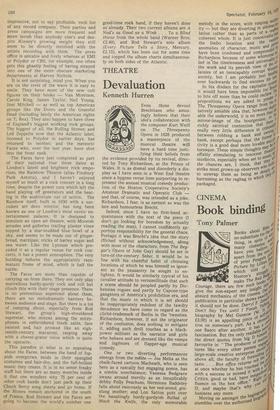THEATRE
Devaluation
Kenneth Hurren
Even those devout Brechtians who amusingly believe that their idol's collaboration with the composer Kurt Weill on The Threepenny Opera in 1928 produced a masterpiece of the musical theatre will have a hard time justifying their beliefs from the evidence provided by its revival, directed by Tony Richardson, at the Prince of Wales. It is as dismal and disorderly a display as I have seen in a West End theatre since a bygone revue item purporting to represent the annual musical comedy production of the Hoxton Cooperative Society's Amateur Dramatic and Operatic Club — and that, of course, was intended as a joke. Richardson, I fear, is as earnest as was the late and humourless Brecht.
Indeed, since I have no first-hand acquaintance with the text of the piece (I don't go looking for boredom by actually reading the man), I cannot confidently apportion responsibility for the general chaos. Perhaps it was Brecht's idea that the story (filched without acknowledgement, along with most of the characters, from The Beggar's Opera of John Gay) should be set in turn-of-the-century Soho: it would be in line with his cheerful habit of choosing locations of which he was himself as ignorant as the peasantry he sought to enlighten. It would be similarly typical of his cavalier attitude to verisimilitude that such a scene should be peopled partly by Dickensian rogues and partly by Capone-type gangsters of America's prohibition era, and that the music to which it is set should be inappropriately redolent of the tawdry decadence we have come to regard as the cliche-trademark of Berlin in the 'twenties. Richardson, however, if not the originator of the confusion, does nothing to mitigate it, adding such droll touches as a blackpower militant as the narrator and girls who behave and are dressed like the vamps and ingénues of flapper-age musical comedy.
One or two diverting performances emerge from the mêlée — Joe Melia as the chalk-faced cartoon Macheath, who is seen here as a rascally but engaging ponce, has a nimble nonchalance; Vanessa Redgrave swans around merrily as an inexplicably debby Polly Peachum; Hermione Baddeley falls about raucously as her red-nosed, ginslung mother; and Lon Satton puts over the hauntingly hurdy-gurdyish Ballad of Mack the Knife, the only memorable melody in the score, with rasping autt°,; ity -but they are diverting in 3nnlesso'ett lation rather than as parts of a °not coherent whole. It is just conceivable doiti the limbo location and the tan„iod anomalies of character, music and Pei by have been condoned and compound°, be. Richardson because of some whinasic;,, of lief in-the timelessness and universaavi. the work and its peevish view of thetey'ro lainies of an inescapably corrupt Wesdid society, but I am probably just beribio over backwards to find excuses far ,ern, In his disdain for the capitalist sYsee' it would have been impossible for 13r/te to bite off more than he could eselletr jo propositions we are asked to P°11,";; re. The Threepenny Opera range from i"-„ior latively amiable idea that, however derty able the underworld, it is no more than the mirror-image of the bourgeoisie, Wre if richly satirical contention that the.„aliii really very little difference in crina;g between robbing a bank and ny'rnplror I bank, except perhaps that the fan) tivity is a good deal more lovable anbe lir turesque. These simple thoughts taa,.Y.trici effably stimulating to innocent tfle'.'oliti intellects, especially when set to ITTsi god the chances are, I think, that they strike most grown-up observers who!, eily to unwrap them as being as deeloil nbaaerrkaasgseindg as the ragbag in which tb"










































 Previous page
Previous page